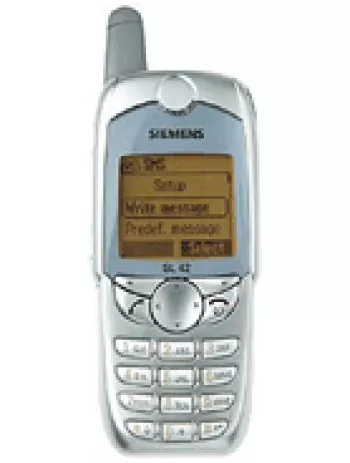
Overview
The Siemens C10 is a classic mobile phone model that reflects the technology of the late 1990s. Although it does not possess many of the features that are now considered standard in today's smartphones, it played a significant role during its time. Released in 1998, this device is a part of the early generation of mobile phones that were primarily used for voice communication and simple text messaging.
Design and Build
The Siemens C10 is characterized by its straightforward and robust design. Its dimensions are 137 x 55 x 22 mm, which gives it a somewhat bulky appearance compared to modern devices. Weighing in at 165 g, it is heavier than today’s phones, but this was typical for devices of that era. The phone was available in three color options: blue, red, and grey, adding a slight touch of personalization for the user. The build quality was solid, designed to withstand everyday use without being overly delicate.
Display
The Siemens C10 features an alphanumeric display, which was common for mobile phones at the time. The screen resolution shows up to 3 x 12 characters, indicating its capability of displaying text messages efficiently. Although the absence of a graphical interface might seem restrictive by modern standards, it was quite sufficient for the C10’s intended use. The display was suited for the simple tasks of dialing numbers and reading text messages.
Network and Connectivity
The Siemens C10 supported GSM technology, operating on the GSM 900 frequency band. It did not have GPRS or EDGE capabilities, as these were not yet widely available technology during its time. The lack of data features highlights the phone’s focus on voice calls and SMS messages. Additionally, there was no support for Bluetooth, WLAN, or USB connectivity, which limits its connectivity options considerably when viewed through a contemporary lens.
Memory and Storage
In terms of memory, the Siemens C10 offered a phonebook capacity of 50 contacts, which was adequate for personal use during its era. It also recorded 5 dialed, 4 received, and 4 missed calls. However, there was no card slot for expandable storage, which aligns with the device's primary function as a communication tool without multimedia capabilities. This limit in storage shows the emphasis on basic utility over extended functionality.
Battery Life
The Siemens C10 was powered by a removable NiMH battery with a capacity of 700 mAh. Despite seeming small by today’s standards, it provided a standby time of about 80 hours and a talk time of 5 hours, which was reasonable for the usage patterns at the time. The battery performance was balanced to ensure that users could stay connected over extended periods without frequent recharging, reflecting efficiency in energy consumption.
Sound and Alerts
The phone lacked a loudspeaker and did not include a 3.5mm audio jack, focusing its utility on monophonic ringtones for alerts. The simplicity of its sound system underlines its restricted audio capabilities, but it effectively catered to basic needs, alerting users to incoming calls and messages through tonal variations.
Features and Applications
As a feature phone operating on basic software, the Siemens C10 focused on essential functionality. It supported SMS for messaging but did not include options for additional applications, internet browsing, or gaming. While there were no built-in alarm or clock features, the device was equipped with support for 20 languages, broadening its accessibility to a wider range of users. Java support and advanced sensor technologies were absent, underscoring its minimalist design philosophy.
Conclusion
The Siemens C10 stands as a testament to the early days of mobile technology, encompassing the essentials of mobile communication without the bells and whistles of modern smartphones. Its design, features, and limitations provide insight into the technological environment of the late 1990s. Although it is now considered obsolete and has been discontinued, understanding the historical context and functional scope of the Siemens C10 helps appreciate the rapid evolution of mobile technology and user expectations.
Key Features of Siemens C10
- GSM 900 Technology
- Compact Dimensions: 137 x 55 x 22 mm
- Lightweight: 165 g
- Mini-SIM Support
- Alphanumeric Display
- Phonebook Capacity: 50 entries
- Basic Call Records: 5 dialed, 4 received, 4 missed
- Monophonic Ringtones
- Support for SMS Messaging
- Available in Three Colors: Blue, Red, Grey
- Removable NiMH 700 mAh Battery
- Stand-by Time: 80 hours
- Talk Time: 5 hours
- Supports 20 Languages
Disadvantages of Siemens C10
- Lacks modern network technologies like GPRS and EDGE.
- Device is discontinued, so support and repairs may be difficult.
- Bulky design with dimensions of 137 x 55 x 22 mm and a weight of 165 g.
- Display is limited to alphanumeric with a low resolution of 3 x 12 characters.
- Very limited memory features with no card slot and a maximum of 50 contacts in the phonebook.
- No camera functionality.
- Sound capabilities are limited with no loudspeaker or 3.5mm jack.
- Lacks connectivity features such as WLAN, Bluetooth, and no radio option.
- No additional features like sensors, browser, clock, alarm, or games.
- Short battery life with a standby time of 80 hours and talk time of 5 hours.
View Also
More Phones
All Rights Reserved +14266 Phones © Mobilawy 2025

























